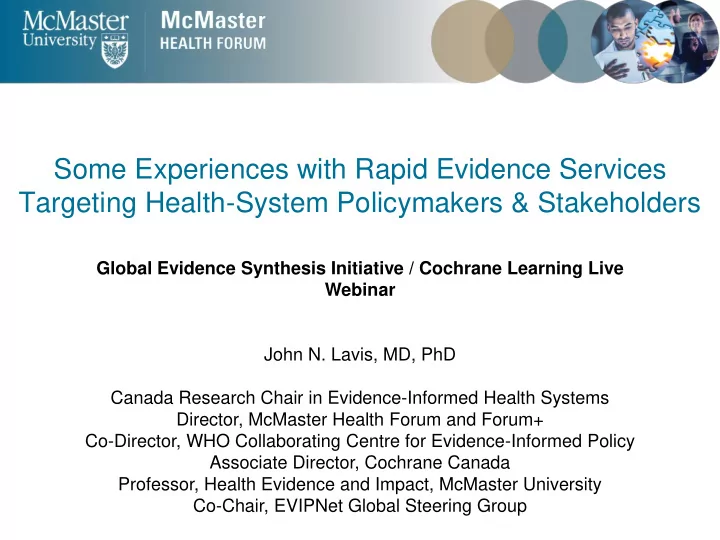

Some Experiences with Rapid Evidence Services Targeting Health-System Policymakers & Stakeholders Global Evidence Synthesis Initiative / Cochrane Learning Live Webinar John N. Lavis, MD, PhD Canada Research Chair in Evidence-Informed Health Systems Director, McMaster Health Forum and Forum+ Co-Director, WHO Collaborating Centre for Evidence-Informed Policy Associate Director, Cochrane Canada Professor, Health Evidence and Impact, McMaster University Co-Chair, EVIPNet Global Steering Group
Conflicts of Interest ▪ Financial None ▪ Professional I have collaborated with many of the chapter contributors I co-chair the Global Steering Group for EVIPNet (Evidence- Informed Policy Networks) and I am the director of the McMaster Health Forum, the activities of which I’ll be describing briefly 2
Four Key Strengths of the Guide ▪ Covers the full life cycle of a review and itemizes the many places in that life cycle where expediting can happen ▪ Supports the active involvement of policymakers and managers ▪ Attends to the particular challenges associated with reviewing health policy and systems research and doing so in low- and middle-income countries ▪ Acknowledges that many types of questions can be asked (and hence many types of reviews are needed), not just questions about what works (and hence just reviews of effects)… although some language (e.g., risk of bias) isn’t as inclusive as this suggests 3
One Key Point that Shouldn’t Get Lost ▪ A categorization of rapid evidence products (on page 6) sends a message that Rapid response briefs don’t generate new knowledge (and aren’t really given any further attention) Rapid reviews generate new knowledge (and they are the focus of almost all of the rest of the guide) ▪ We need many types of rapid evidence products (and I expect the guide’s contributors would agree with me) 4
Why Rapid Response Briefs (Too) ▪ Rapid synthesis Summary of the best available evidence on any question … lightly contextualized to a health and political system … on timelines that policymakers and stakeholders can work with (e.g., 3, 10 or 30 business days) ▪ Evidence brief for policy Summary of the best available evidence about a problem, three options to address it, and key implementation considerations … heavily contextualized to a health and political system … increasingly complemented by a citizen brief … used as an input to a citizen panel or stakeholder dialogue (to give you research evidence, citizen values & stakeholder insights) … still on reasonable timelines (e.g., 7 -10 weeks including a dialogue or a dialogue plus panels) 5
Examples of (EVIPNet) Rapid Evidence Services Feature AFRO AMRO/PAHO EMRO REACH EVIPNet EVIPNet EVIPNet McMaster Knowledge Policy Burkina Faso Cameroon Chile Health to Policy Uganda Forum Center # syntheses 86 10 8 57 30 4 prepared (in 7.5 years) (in 6 years) (in 7 years) (in 4 years) (in 4 years) (in 2 years) (since when) Turn-around 20 days but 15 days 30 days 5, 10, 15 or 3, 10 and 30 3, 10 and 30 time (busi- most 15 days 20 days (but days days ness days) (3 in 1 day) most 20) Topic areas Public health Public health Public health covered System System System System System System Questions Any Any Any Effects only Any Any addressed Types of Reviews Reviews Reviews Reviews Reviews & Reviews evidence (studies if no (studies if no (and (studies if no EEs (studies (+/- studies if examined reviews) reviews) frameworks ) reviews) if no reviews) 30 day) 6
Examples of (EVIPNet) Rapid Evidence Services (2) Feature AFRO AMRO/PAHO EMRO REACH EVIPNet EVIPNet EVIPNet McMaster Knowledge Policy Burkina Faso Cameroon Chile Health to Policy Uganda Forum Center Types of Local data Local data Local data Local data Jurisdic- Local data complement- and reports and reports and reports tional scans and ary info. jurisdictional included scans (30d) Nature of Active Passive and Mostly active Active Active None, decision- active (in 2 steps) passive and maker active involvement Nature of Internal No Internal (but Internal External Internal (all) peer/merit (process) not Requester ( with External (30 review External structured) revision day) (content) sent ) Nature of Dialogue No No Dialogue No Clarification follow-up 7
Examples of (EVIPNet) Rapid Evidence Services (3) Feature AFRO AMRO/PAHO EMRO REACH EVIPNet EVIPNet EVIPNet McMaster Knowledge Policy Burkina Faso Cameroon Chile Health to Policy Uganda Forum Center Outputs Yes No Some No Yes (except Yes made for political publicly parties) available What other Briefs Briefs (past) Briefs Briefs Briefs Briefs strategies Dialogues Dialogues Dialogues Dialogues Panels Dialogues used Workshops (past) Workshops Workshops Dialogues One-stop Workshops shop One-stop shop (HSE) Evaluations Yes No No Not yet Not Not yet Handbook published yet available 8
Conclusion ▪ Great guide on rapid reviews ▪ We need similarly great guides on other types of rapid evidence products (and the one on what I’ve called rapid syntheses can build on the work done by Michelle Haby and colleagues) 9
With Thanks for the ‘Rapid Responses’ ▪ AFRO Rhona Mijumbi-Deve (mijumbi@yahoo.com), REACH Policy Uganda André Zida ( zidaandr@yahoo.fr), EVIPNet Burkina Faso Pierre Ongolo-Zogo (pc.ongolo@gmail.com), EVIPNet Cameroon / Centre for the Development of Best Practices in Health ▪ AMRO/PAHO Cristian Mansilla (cristian.mansilla@minsal.cl), EVIPNet Chile Francois-Pierre Gauvin (gauvinf@mcmaster.ca) / Mike Wilson, McMaster Health Forum ▪ EMRO Fadi El-Jardali (fe08@aub.edu.lb) / Racha Fadlallah, Knowledge to Policy Center, American University of Beirut 10
Recommend
More recommend